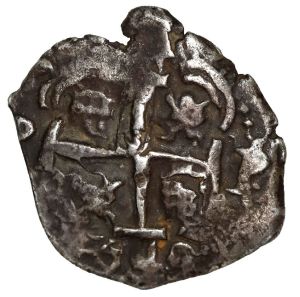Bolivia 1740-P P 2 reales
The first specimen was lot 1863 in Stephen Album sale 38 (Santa Rosa, CA, September 2020), where it did not sell. The catalog description[1] noted, "BOLIVIA: Felipe V, 1700-1746, AR 2 reales [1]740-P, assayer P, cob coinage, 2 mintmarks, 2 dates, 3 assayers, crude, but full cross visible, Fine." The second specimen was lot 929 in Sedwick sale 34 (Winter Park, FL, November 2023), where it sold for $336. The catalog description[2] noted, "Potosí, Bolivia, cob 2 reales, 1740 P/M, unique. Chunky and darkly toned VF with full pillars and cross, two dates, three mintmarks and assayers, with all three showing clear traces of under-assayer M, a logical but heretofore unknown example of the transition." Two assayers are known for 1740: assayer M (1737-40) and assayer P (1740-42). The type is not rare but is less often seen than the eight reales. The Potosí mint was the most prolific issuer of silver during the seventeenth and early eighteenth centuries, nearly all of it cobs such as this. This type was struck 1729-47 and superseded an earlier type (KM 29) which was 0.931 fine silver. The other Latin American mints placed the date near the edge where it rarely struck up, whereas Potosi issues have the date smack in the middle, ensuring that the date would be legible even if the rest of the design was smeared. As a result, Bolivian cobs can be collected by date, unlike the other mints (Mexico, Lima, Guatemala). The Potosí mint was the last to abandon the manufacture of cobs, in 1773.
Recorded mintage: unknown.
Specification: 6.77 g, 0.917 fine silver; the first specimen 6.27 g, the second specimen 6.41 grams.
Catalog reference: S-P48; KM-29a, Cayón-8890.
- Cayón, Adolfo, Clemente Cayón and Juan Cayón, Las Monedas Españolas, del Tremis al Euro: del 411 a Nuestros Dias, 2 volumes, Madrid: Cayón-Jano S.L., 2005.
- Calicó, Xavier, Numismática Española: Catálogo General con Precios de Todas las Monedas Españolas Acuñadas desde Los Reyes Católicos Hasta Felipe VI, 1474 a 2020, Barcelona: Aureo & Calicó, 2019.
- Menzel, Sewall, Cobs, Pieces of Eight and Treasure Coins, New York: The American Numismatic Society, 2004.
- Michael, Thomas, Standard Catalog of World Coins, 1701-1800, 7th ed., Iola, WI: Krause Publications, 2016.
- [1]Album, Stephen, Joseph Lang, Paul Montz, Michael Barry and Norman Douglas Nicol, Auction 38, featuring the Dabestani Collection of Persian Coins, Santa Rosa, CA: Stephen Album Rare Coins, Inc., 2020.
- [2]Sedwick, Daniel Frank, Augi Garcia, Cori Sedwick Downing and Connor Falk, Treasure Auction 34, World, U.S Coins and Paper Money, Winter Park, FL: Daniel Frank Sedwick LLC, 2023.
Links:



